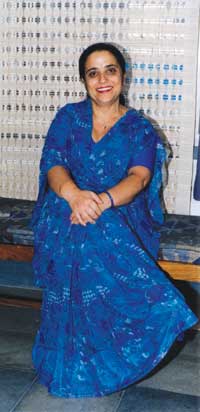 Next time you drive up Kupondole towards Patan, look at some of the classy handicraft shopfronts on either side of the road and you may just see Meera Bhattarai visiting her retailers.
Next time you drive up Kupondole towards Patan, look at some of the classy handicraft shopfronts on either side of the road and you may just see Meera Bhattarai visiting her retailers. Meera has broken away from the mould of women-headed crafts production for charity, and plunged headlong into the management and marketing style of hard-nosed business, embracing competition and rigorous quality standards, and catering to the latest trends.
Watching Meera function, you'd think she was in the corporate world, and not the founder of the Association of Craft Producers. As executive director, she has been able to balance business with social obligations, developing what she calls a "socially-oriented, commercially viable enterprise".
Meera has come a long way since she first started managing women's skill development at the Nepal Women's Organisation 25 years ago. As a psychology graduate, she has used her academic background and learnt over the years that the only way is to combine charity with entrepreneurship.

"It's helped me understand people's attitudes," says an introspective Meera about the people she meets everyday: small craft producers, mostly low-income women, sophisticated international buyers, businessmen (and they are almost always men) wanting to cash in on the handicraft trade, bureaucrats from the labour department, and most recently-and bruisingly-dogged trade unionists.
Meera says she has inherited her strong sense of altruism from her mother, and she wanted to help other women like her stand on their own feet with income generation and skills training. "My mother would always feed and clothe people who came to our door, she never turned anyone away," she recalls.
But as Meera learnt over the years, kindness and generosity are not enough. Continuous charity makes people dependent, her idea is to give people fishing nets, not fish. Today, her organisation helps women strike out on their own, develop craft and management skills, self-confidence, and a sense of ownership over their products.
The group helps women develop product ideas and marketing arrangements that allow a sufficient margin to provide not only competitive incomes, but a wide array of fringe benefits not common in Nepal today, including an emergency welfare fund, annual bonuses, and a retirement plan. There is even an "educational allowance benefit program" to help female children go to school. The finished products are displayed at Dhukuti, the ACP's trendy Kupondole outlet.


